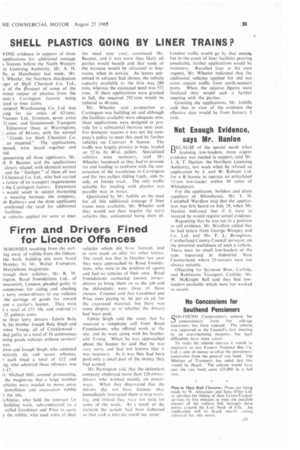SHELL PLASTICS GOING BY LINER TRAINS?
Page 33

If you've noticed an error in this article please click here to report it so we can fix it.
VING evidence in support of three applications for additional tonnage
licences before the North Western ty Licensing Authority, Mr. A. H. le, at Manchester last week. Mr. I. Wheeler, the Northern distribution ager of Shell Chemical Co. Ltd., e of the prospect of some of the tional output of plastics from the patty's Carrington factory being :ated to liner trains.
verpool Warehousing Co. Ltd. was ying for six artics of 63 tons; 'riestner Ltd., Urmston, seven allies 31-tons; and Greenwoods Transport , Edmonton (base at Warrington), artics of 84 tons, with the normal : Goods for Shell Chemical Co. . as required." The applications, named, were heard together and ted.
;presenting all three applicants, Mr. EL P. Beanies said the applications closely related, with identical normal and the "linchpin" of them all was I Chemical Co. Ltd., who had carried review of its transport requirements the Carrington factory. Extensions would result in. output increasing a meeting between the company, sh Railwa■s and the three applicants confirmed the need for additional facilities.
ie vehicles applied for were to meet the need next year, continued Mr. Beames, and it was more than likely all parties would benefit and that some of the increase would be allocated to liner trains, when in service. As letters submitted in advance had shown, the vehicle capacity available to the firm was 280 tons, whereas the estimated need was 572 tons. If these applications were granted in full, the required 292 tons would be reduced to 40 tons.
Mr. Wheeler said production at Carrington was building up and although the facilities available were adequate now, these applications were designed to provide for a substantial increase next year. For domestic reasons it was not the company's policy to meet this need by further vehicles on Contract A licence. The traffic was largely plastics in bags, loaded on 52 in. by 40 in. pallets. Specialized vehicles were necessary, said Mr. Wheeler. inasmuch as they had'to provide for end loading to conform with the construction of the warehouse at Carrington and for two pallets sliding freely, side by side, on Joloda track. The only traffic suitable for loading with plastics was paraffin wax in boxes.
Questioned by Mr. Jollitre on the need for all this additional tonnage if liner trains were available, Mr. Wheeler said they would not then require the extra vehicles they anticipated being short of. London traffic would go by that means, but in the event of liner facilities proving unsuitable, further applications would be necessary. Recalled later at his own request, Mr. Wheeler indicated that the additional vehicles applied for did not cover export traffic from north-western ports. When the relative figures were finalized they would seek a further meeting with the parties.
Granting the applications, Mr. Jolliffe said that in view of the evidence the effective date would be from January 1 next,












































































































